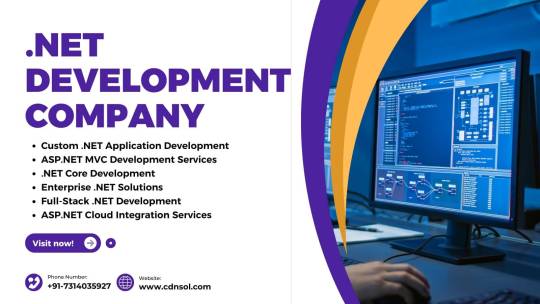#NET Core framework
Explore tagged Tumblr posts
Text
#cosmickittytalk#codeblr#girls who code#programming#coding#csharp programming#csharp#ide#.net framework#.net developers#.net core#.net#.net maui#avalonia#rider ide#Jetbrains#vscode#visual studio code#visual studio#notepad++#vim#sublime text#coding environment
6 notes
·
View notes
Text
Top .NET Development Company | Custom .NET Solutions for Enterprises
Looking for a .NET development company? We provide full-stack .NET app development services using Microsoft’s .NET technology. From custom .NET solutions to enterprise-level ASP.NET applications, we deliver scalable and innovative software to meet your business needs. Visit now to know more.

#.net development company#.net development services#.net application development company#best .net application development company#customized .net solutions#microsoft's .net technology#.net development#.net technology#asp.net development services#.net app development services#.net framework services#custom .net application development#enterprise .net solutions#asp.net mvc development services#full-stack .net development#asp.net cloud integration services#asp.net applications#.net solutions#.net core development
0 notes
Text

1 note
·
View note
Text
Former New York city mayor Michael Bloomberg is joining with other US climate organizations to fund the United States entire 21% contribution to the United Nations Framework Convention on Climate Change. This will allow the organization to remain fully functional in the wake of Trump's withdrawal from the Paris Agreement. This contribution will continue at least until the United States is able to rejoin the Paris Agreement.
I dislike the existence of billionaires as much as the next person, but it is refreshing to see one of them actually using their money to do a net good for the planet.
7K notes
·
View notes
Text
0 notes
Text
Asp net core web api with entity framework database 2024

Compatibility with popular .NET frameworks with built-in connection with well-known ASP.NET Core framework, Entity Framework, and Microsoft.NET Framework are popular .NET frameworks. Extensions, Serilog is most frequently utilized within the .NET community.
0 notes
Text
In the ever-evolving landscape of technology, staying ahead of the curve is crucial for businesses striving to deliver innovative Software Development solutions. Microsoft, a pioneer in the software industry, has unveiled its latest project, .NET Aspire, ushering in a new era for cloud-native application development.
In this blog post, we’ll delve into the key features and benefits of .NET and explore how it can revolutionize your development projects.
Click here to Read more about this Blog !!
#.net development company#.net software development#.net developers#.net core#.net framework#.net development#.net maui#.net
0 notes
Text
Beyond Code: Exploring the Business Benefits of Choosing .NET for Development
In today's rapidly evolving digital landscape, businesses are increasingly reliant on robust and efficient software applications to fuel their growth and success. Choosing the right development framework plays a crucial role in the success of these applications. One such framework that has gained immense popularity over the years is .NET.
Beyond being just a coding platform, .NET offers a wide range of business benefits that go beyond the realm of code. From enhanced productivity and seamless integration to scalability, security, and long-term cost savings, this article explores the numerous advantages of choosing .NET for development. By delving into these aspects, businesses can gain a comprehensive understanding of why .NET stands out as a top choice for building powerful and successful software applications.
1. Introduction: The Power of .NET Development
With the ever-evolving landscape of technology, businesses are constantly on the lookout for the best development platform to build their applications. One platform that has gained significant popularity and trust over the years is .NET. But what makes .NET such a powerful choice for development? In this article, we will delve into the business benefits of choosing .NET, exploring its enhanced productivity, seamless integration, and scalability, all while maintaining a high level of performance.
1.1 Why Choose .NET for Development? Before we dive deeper, let's address the burning question: Why should businesses choose .NET for their development needs? Well, .NET offers a robust and reliable framework for building a wide range of applications. Its versatility allows developers to create everything from web applications to mobile apps, with seamless integration and interoperability. Moreover, its extensive library of pre-built components and tools streamline the development process, enabling faster time-to-market and reducing costs.
1.2 Overview of the Article In this article, we will explore the various business benefits of choosing .NET for development. We will start by examining the enhanced productivity and efficiency that .NET brings to the table. From simplified development processes to rapid application development and code reusability, we will uncover how .NET can boost your team's performance.
Next, we'll take a closer look at the seamless integration and interoperability capabilities of .NET. We'll discuss how it seamlessly integrates with existing systems, allowing businesses to leverage their current infrastructure. Furthermore, we'll explore how .NET can communicate and work with various technologies, enabling businesses to expand their capabilities.
Lastly, we'll examine the scalability and performance aspects of .NET. We'll delve into how .NET empowers businesses to scale their applications effortlessly, handle high traffic, and manage large data sets without compromising on performance. So, without further ado, let's explore why .NET is more than just code.
`2. Enhanced Productivity and Efficiency with .NET
When it comes to development, time is money, and efficiency is key. Fortunately, .NET offers a range of features and tools that enhance productivity, making development a breeze.
2.1 Simplified Development Process .NET simplifies the development process by providing a comprehensive and intuitive framework. Its powerful tools, such as Visual Studio, enable developers to streamline their workflows, automate repetitive tasks, and focus on the core logic of their applications. With built-in debugging and testing capabilities, developers can easily squash bugs and ensure the quality of their code. This simplification leads to faster development cycles and reduces the chances of errors creeping into the final product.
2.2 Rapid Application Development (RAD) with .NET In today's fast-paced business environment, speed is of the essence. With .NET, businesses can leverage the Rapid Application Development (RAD) approach. The framework's rich library of pre-built components and templates allows developers to assemble applications quickly and efficiently. By eliminating the need to reinvent the wheel, businesses can shorten the development cycle, reducing time-to-market and gaining a competitive edge.
2.3 Code Reusability and Maintainability Maintaining codebases can be a nightmare, but not with .NET. The framework promotes code reusability through its modular architecture, allowing developers to recycle code across projects seamlessly. This not only speeds up development but also ensures consistency and reduces the chances of errors. Additionally, .NET's robust design patterns and practices make it easier to maintain and update applications as business requirements evolve, saving time and effort in the long run.
3. Seamless Integration and Interoperability
In today's interconnected world, businesses rely on various systems and technologies. Luckily, .NET excels in seamless integration and interoperability, making it an ideal choice for businesses that need to play well with others.
3.1 Integration with Existing Systems One of the key strengths of .NET is its ability to integrate smoothly with existing systems. Whether it's legacy applications or third-party software, .NET provides tools and frameworks to connect these systems seamlessly. This integration capability allows businesses to leverage their current infrastructure, avoiding costly and disruptive migrations. With .NET, it's all about working smarter, not harder.
3.2 Interoperability with Various Technologies Being locked into a single technology stack can limit a business's potential. Fortunately, .NET is incredibly versatile and interoperable. It can communicate with different technologies and platforms, including Java, Python, and even mobile platforms like iOS and Android. This flexibility empowers businesses to expand their horizons, adopt new technologies, and access a broader customer base without having to start from scratch.
4. Scalability and Performance: Empowering Business Growth
For businesses aiming for growth and success, scalability and performance are non-negotiable. Luckily, .NET offers the necessary tools and techniques to ensure your applications can handle the demands of a rapidly expanding user base.
4.1 Scalability in .NET Applications .NET provides a solid foundation for building scalable applications. Its distributed computing capabilities, coupled with frameworks like ASP.NET and Azure, enable businesses to handle increased loads seamlessly. Whether it's adding more servers or adopting cloud services, .NET makes scalability a breeze.
4.2 Performance Optimization Techniques When it comes to performance, .NET leaves no stone unturned. The framework offers a myriad of performance optimization techniques, including caching, data access optimization, and asynchronous programming. By employing these techniques, businesses can ensure that their applications perform at their best, providing a smooth and responsive experience to users.
4.3 Handling High Traffic and Large Data Sets High traffic and large data sets can spell trouble for underperforming applications. However, with .NET, businesses can handle these challenges effortlessly. The framework's advanced caching mechanisms, along with its support for distributed computing and database technologies like SQL Server, enable businesses to handle massive amounts of data and serve a large number of users simultaneously without breaking a sweat.
5. Strong Security and Robustness in .NET Development
When it comes to choosing a development framework, security should always be a top priority. With .NET, you can rest easy knowing that it offers a range of security features that will keep your applications safe from potential threats.
5.1 Security Features in the .NET Framework .NET comes equipped with various security features, such as code access security, which allows you to control the permissions granted to your code. Additionally, the framework includes mechanisms for encryption, authentication, and authorization, ensuring that your application and its data remain protected.
5.2 Best Practices for Secure Development In addition to its built-in security features, .NET also promotes best practices for secure development. This includes guidelines for secure coding, data validation, and input sanitization. By following these best practices, you can further enhance the security and robustness of your application.
5.3 Handling Vulnerabilities and Threats Despite the best security measures, vulnerabilities and threats can still arise. However, the .NET community is constantly vigilant in detecting and addressing such issues. Microsoft regularly releases security updates and patches to address vulnerabilities, ensuring that your application remains secure and protected from emerging threats.
6. Cost-effectiveness and Long-term Savings
When it comes to business decisions, cost-effectiveness is always a major consideration. Choosing .NET for development can offer significant long-term savings for your organization.
6.1 Reduced Development Time and Costs .NET provides a rich set of tools and libraries that streamline development processes and reduce the time it takes to build applications. Its extensive class libraries and built-in functionalities eliminate the need to reinvent the wheel, resulting in faster development cycles and reduced costs.
6.2 Lower Maintenance and Support Expenses Once your application is up and running, ongoing maintenance and support are essential. With .NET, the framework's stability and backward compatibility ensure that your applications require minimal maintenance and updates over time. This translates into lower expenses and reduced dependency on constant fixes and updates.
6.3 Cost Comparison with Alternative Technologies When comparing the overall cost of utilizing .NET with alternative technologies, it becomes clear that .NET offers a cost-effective solution. Its robust framework, coupled with its extensive developer community and resources, allows for faster development and reduced maintenance costs compared to other frameworks.
7. Access to a Vast Developer Community and Resources
The strength of any development framework lies not only in its features and capabilities but also in the community that supports it. In this regard, .NET shines bright and offers a wealth of benefits.
7.1 Active .NET Developer Community The .NET developer community is vibrant, active, and constantly growing. Whether you need guidance, support, or simply want to learn from others' experiences, you'll find a vast network of developers ready to assist you. Joining this community opens doors to collaboration, knowledge sharing, and staying up-to-date with the latest trends and innovations.
7.2 Abundance of Learning Materials and Documentation Learning .NET is made easy thanks to the abundance of learning materials and documentation available. From official Microsoft documentation to online tutorials, forums, and video courses, you'll find a wealth of resources to enhance your skills and stay ahead of the curve.
7.3 Availability of Third-party Libraries and Tools The .NET ecosystem boasts a wide array of third-party libraries and tools that can greatly expedite your development process. Whether you need charting libraries, UI frameworks, or integration tools, you'll find a vast selection to choose from. This saves you time and effort by leveraging pre-existing solutions rather than reinventing them from scratch.
Conclusion: The Competitive Edge of Choosing .NET for Development
Choosing .NET for development not only offers robust security features and long-term cost savings but also grants you access to a thriving developer community and abundant resources. With its strong security measures, cost-effectiveness, and vast support network, .NET provides a competitive edge for businesses seeking a reliable and efficient development framework. So why settle for anything less when you can embrace the power of .NET?8. Conclusion: The Competitive Edge of Choosing .NET for Development
In conclusion, opting for .NET as the development framework offers businesses a significant competitive edge in today's digital landscape. With its ability to enhance productivity, enable seamless integration, ensure scalability and performance, provide strong security measures, deliver long-term cost savings, and offer access to a vast developer community and resources, .NET proves to be a powerful choice for businesses seeking to build robust and successful software applications. By harnessing the full potential of .NET, businesses can elevate their development processes and unlock new opportunities for growth and innovation.
Choosing .NET for development goes beyond just writing code. It empowers businesses with enhanced productivity, seamless integration, and scalability, while ensuring optimal performance. By selecting .NET, your business can build robust and future-proof applications, ultimately gaining a competitive edge in the ever-evolving digital landscape. So why settle for anything less when you can have the power of .NET?
FAQ
Is .NET only suitable for large-scale enterprise applications? Not necessarily. While .NET is indeed an excellent choice for building complex enterprise applications, it is also suitable for projects of varying sizes. The versatility of .NET allows developers to create everything from small-scale applications to large-scale enterprise solutions.
Does using .NET require a specific operating system? No, .NET is a cross-platform framework. It supports development on various operating systems, including Windows, macOS, and Linux. This cross-platform compatibility ensures that applications developed with .NET can run seamlessly on different operating systems without sacrificing performance or functionality.
Are there any limitations to using .NET for development? While .NET offers a wide range of advantages, it's important to note a few limitations. For instance, some developers argue that .NET can have a steeper learning curve compared to other frameworks. Additionally, as a Microsoft framework, some technologies and tools may be more optimized for Windows environments. However, these limitations are outweighed by the numerous benefits that .NET brings to the table.
Is it possible to integrate existing systems with .NET applications? Absolutely! .NET provides excellent support for integrating existing systems. Whether you need to connect with legacy systems, databases, or third-party APIs, .NET offers robust tools and libraries for seamless integration and interoperability. This allows businesses to leverage their existing infrastructure while benefiting from the power and flexibility of .NET.
#.net development#.net framework#.net developers#.net core development#software development#it outsourcing#outsourcing#agile methodology#it staff augmentation
0 notes
Text




Days 110 to 118 of coding everyday for a year and I've gotten so much done!
I finish both of my finals the C++ and the C#. The C++ final is an adventure game and it wasn't too challenging to make honestly I had fun with it. The C# project was also fun because I got to play with microcharts when creating the statistics page to display collected data! I plan to make the C++ game more fun honestly because I can't just let it die from here. I am going to make the Android and iOS build better on the C# project. I'm really proud of myself today :)
My next adventures will be brushing up on JavaScript since I'm severely out of practice and using what I know to make my portfolio website using Blazor!
#self improvement#cosmickittytalk#codeblr#csharp programming#csharp#csharp is superior#girls who code#programming#coding challenge#coding for a year#coding exercises#coding#learning new syntax#learning programming#learning to code#college homework#college life#college finals#computer science major#programmer#work in progress#maui app#.net developers#.net framework#.net development#.net core#.net maui#.net#c++ course#c++ programming
17 notes
·
View notes
Text
Why and how to Convert .NET Framework to .NET Core in easy and effective steps. Explore how to make your application ready for migration
0 notes
Text
ASP.NET Core and ASP.NET Framework are both web development frameworks from Microsoft, but they are designed for different use cases and have distinct features. Understanding the differences between them is essential for developers when choosing the right framework for their project.
1 note
·
View note
Text
ASP.Net vs ASP.Net Core. This article is about the differences between ASP.Net and ASP.Net Core. Here, you can get a comparison between ASP.Net and ASP.Net Core.
ASP.NET is a fundamental web development platform used to create websites, applications, and web services. It is the integration of HTML, CSS, and JavaScript. Originally ASP.net was released in 2002. The first version of Asp.Net deployed was 1.0. The Recent Version of Asp.Net is 4.6.
Looking to hire .NET developer for your next project?
Asp.Net works on HTTP (Hypertext Transfer Protocol) and uses the HTTP commands and policies to set a browser-to-server bilateral communication.
ASP.NET is a part of the Microsoft .NET Framework. The following image shows the component stack.
#asp.net vs asp.net core#difference between asp.net and asp.net core#asp.net#asp.net core#asp.net developers#asp net framework#.net core vs asp.net core#net core vs net framework#.net vs .net core#asp.net development#aspnet framework#asp.net vs .net core#.net vs asp.net#what is asp net#asp.net core vs .net core#asp.net core vs asp.net#custom software development#software outsourcing
0 notes
Text
Due to its better performance, ability to operate across several platforms (cross-platform), and "n" number of additional features,.NET Core has seen a significant growth in popularity.
The migration process will only seem difficult if you have good direction and a thorough understanding of the stages required. In order to effectively transition from the.NET Framework to.NET Core, a thorough guide is provided in this article.
This blog is all about why it is essential for developers to migrate form .NET framework to .NET core and how they can do it
Read more: https://www.websitetemplates.org/blog/2023/08/a-comprehensive-guide-about-migrating-from-net-framework-to-net-core
0 notes
Text
0 notes
Text

It is important to stay up-to-date with the latest .NET development trends to ensure that you are leveraging the latest technologies and best practices.
This can help you to build more efficient, secure, and scalable applications. Additionally, staying up-to-date with the latest trends can help you to stay competitive in the job market and advance your career as a .NET developer.
Update the latest trends of .Net development: https://bit.ly/44pUT11
0 notes